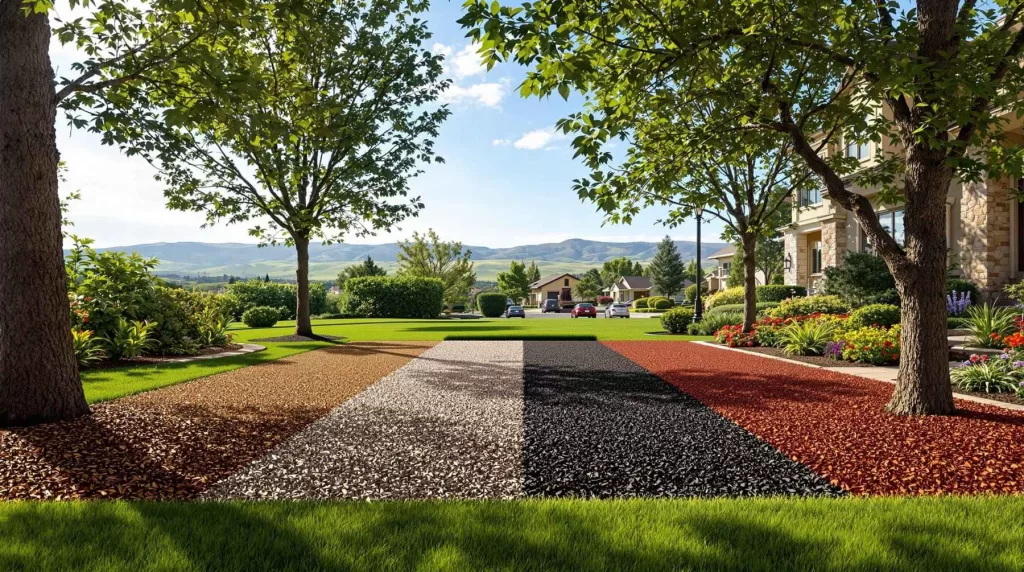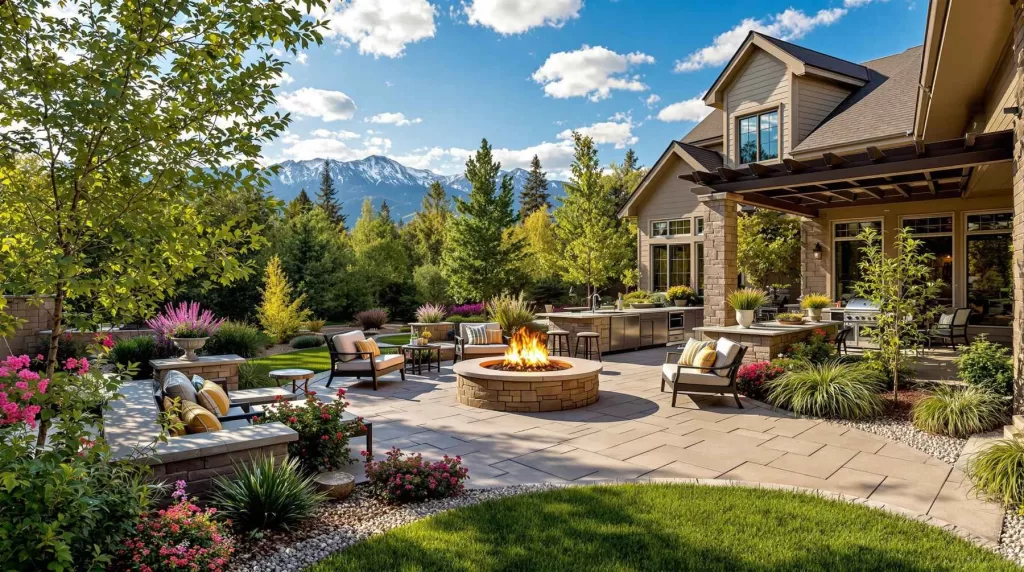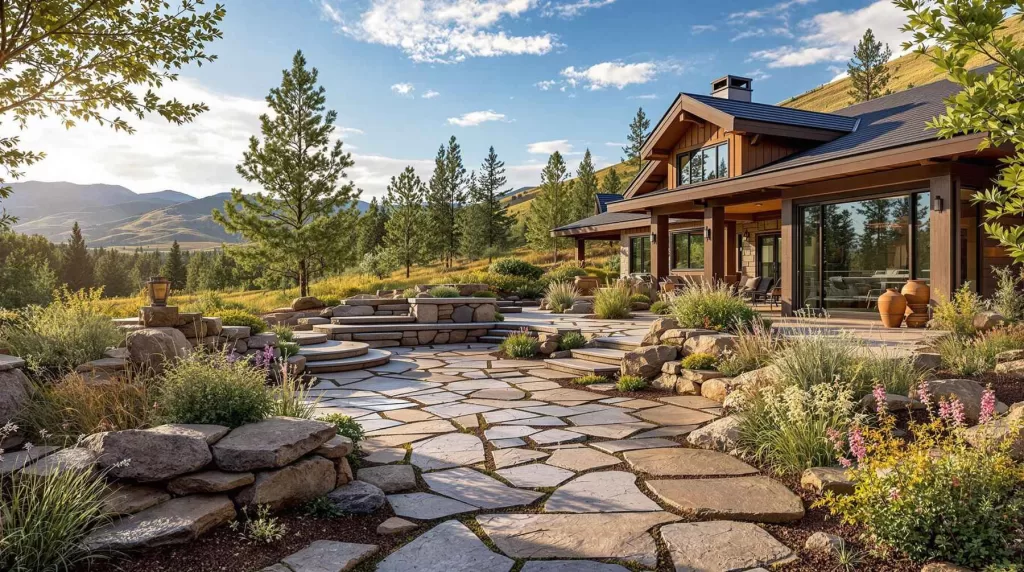Introduction
Natural stone has long been a favorite among Colorado homeowners for its durability, timeless appeal, and ability to blend seamlessly into natural surroundings. In Castle Pines, where mountain views and upscale homes meet rugged terrain, incorporating stone into your landscape design isn’t just a trend — it’s a way to create lasting beauty and harmony with the environment.
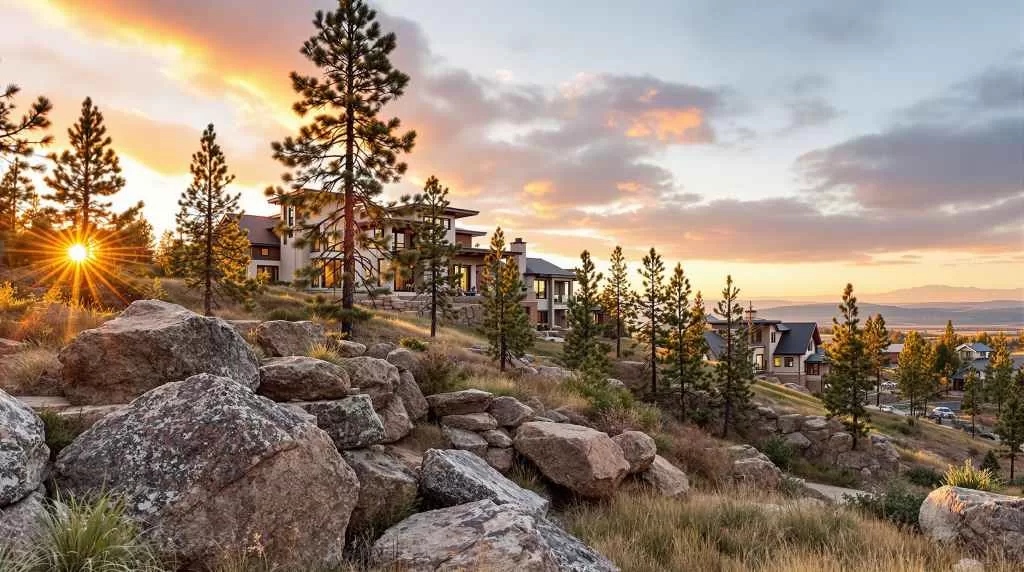
Why Castle Pines Is Perfect for Natural Stone Landscaping
When planning a Castle Pines landscaping project, natural stone is one of the most versatile and value-boosting elements you can include. The area’s elevation, terrain, and architectural style make it an ideal setting for stone features that feel both organic and upscale.
Natural Stone Matches the Rustic Elegance of Castle Pines Homes
Castle Pines homes are often designed with rustic, mountain-inspired architecture, and natural stone complements that aesthetic perfectly. Whether it’s a flagstone patio that mirrors the textures of surrounding rock formations or a sandstone wall that reflects the warm hues of the Colorado sunset, stone adds authenticity and charm.
Durability for Castle Pines’ Unique Climate and Elevation
At over 6,000 feet in elevation, Castle Pines experiences dramatic temperature shifts, snow, and strong sun exposure. Natural stone holds up beautifully in this environment, resisting cracking, fading, and erosion. Its ability to withstand freeze-thaw cycles makes it one of the most practical materials for outdoor features.
Increasing Property Value in a High-End Market
In a luxury community like Castle Pines, landscaping isn’t just about aesthetics — it’s about adding value. High-quality stonework boosts curb appeal and creates lasting impressions. Buyers are drawn to properties with professionally installed stone patios, retaining walls, and entryways that signal quality and craftsmanship.
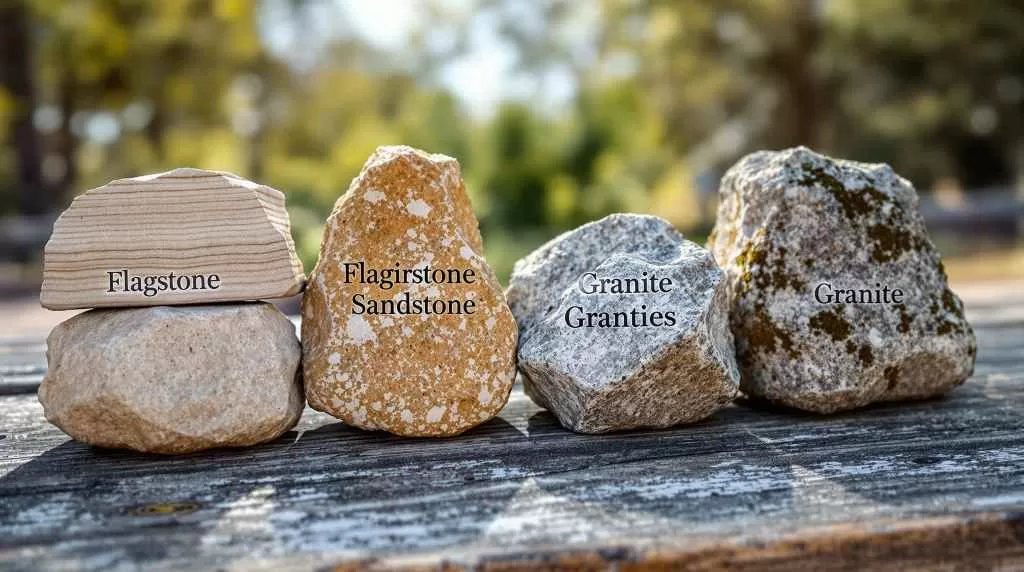
Types of Natural Stone Commonly Used in Castle Pines
When considering Castle Pines landscape improvement ideas, natural stone is one of the most impactful and timeless materials available. It offers a wide variety of textures, colors, and uses — from walkways to walls — all while blending effortlessly with the area’s natural surroundings.
Flagstone for Patios and Pathways
Flagstone is a top choice for patios and walkable surfaces thanks to its natural grip, earthy tones, and irregular shapes that give each installation a one-of-a-kind feel. Its wide, flat surface makes it ideal for outdoor living areas, especially in Colorado’s rugged yet refined settings.
Boulders for Accents and Structure
Large boulders are not just decorative — they serve structural purposes like retaining soil, anchoring slopes, or even acting as natural seating. When placed strategically, boulders bring scale, dimension, and a bold visual impact to any landscape design.
Sandstone and Colorado Buff for Retaining Walls
Sandstone and locally sourced Colorado Buff stone are frequently used for retaining walls due to their warm colors and natural compatibility with the Colorado environment. These stones stack well, offer strong support, and align with many HOA-approved palettes.
Granite for Fire Features and Outdoor Kitchens
Granite is prized for its exceptional durability and refined appearance, making it perfect for high-use areas like outdoor kitchens, grill surrounds, and fire pits. Its resistance to heat and weather means it retains its beauty even after years of exposure to Castle Pines’ intense elements.
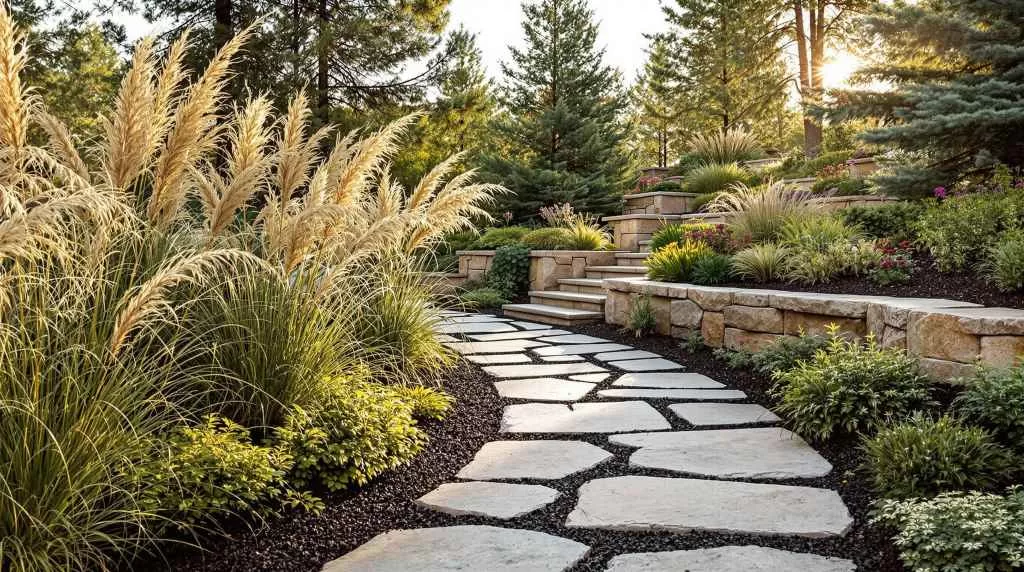
Designing with Natural Stone in Mind
Working with trusted Castle Pines landscapers ensures that your stone features are not only beautiful but also intentionally placed to enhance functionality, visual flow, and long-term performance within your landscape design.
Blending Stone with Softscaping
Pairing natural stone with well-chosen plantings can create a visually balanced and organic landscape. For example, soft grasses between stepping stones or flowering perennials around boulder accents help soften hard edges while bringing seasonal color to the space.
Creating Flow with Stone Pathways
Strategically placed stone paths guide movement through the yard, connecting focal points like patios, gardens, or fire features. Curved flagstone or stepping stone walkways also add rhythm and visual interest, encouraging natural exploration.
Highlighting Elevation Changes with Stonework
Castle Pines properties often have rolling terrain, making stone the perfect material for tiered designs, risers, and terraces. These elements not only manage slopes safely but also add depth and architectural definition to the outdoor space.
Using Stone to Frame Landscape Features
Framing elements like garden beds, water features, or outdoor seating areas with natural stone helps define space and create visual anchors. Whether it’s a border of river rock or a low stone wall, these edges create clean transitions while emphasizing focal areas.
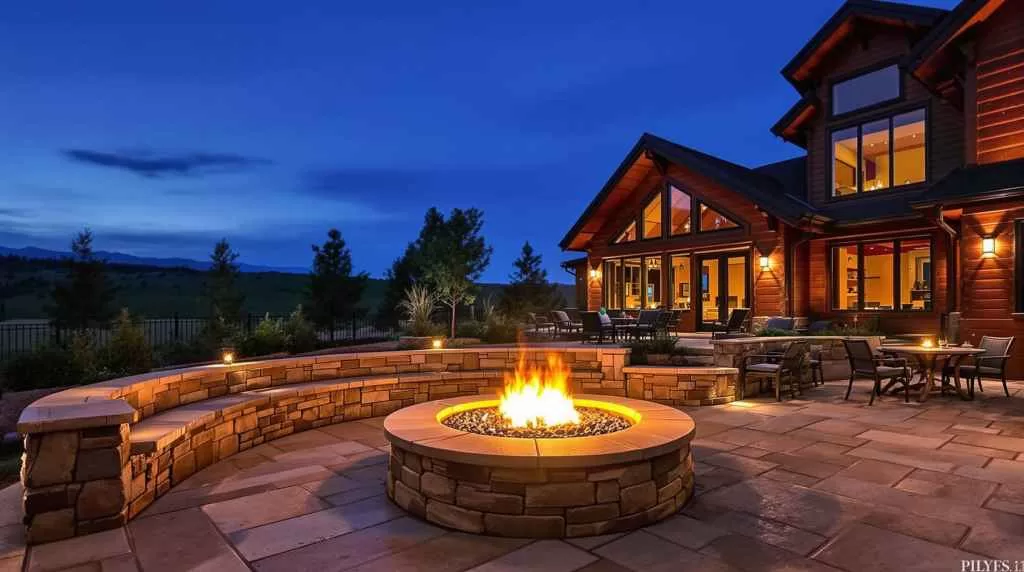
Natural Stone Features That Make a Statement
If you’re looking to elevate your outdoor space in Castle Pines, natural stone can be the foundation of bold, eye-catching features that define the feel and flow of your yard. These elements go beyond basic functionality — they create unforgettable outdoor experiences.
Outdoor Fireplaces and Fire Pits
Stone fire features offer both beauty and warmth, making them a natural gathering point for family and friends. Whether built from rugged boulders or precision-cut blocks, these elements enhance ambiance and allow for year-round outdoor use.
Natural Stone Water Features
From bubbling fountains to cascading waterfalls, water features crafted from stone add soothing sound and visual movement to your landscape. Stone helps these installations blend into the environment, offering a more tranquil and natural appearance than manufactured alternatives.
Stone Staircases and Entryways
A grand stone staircase or front entry can set the tone for the entire property. These features offer safe navigation across changes in elevation while adding a polished, high-end feel that complements Castle Pines’ architectural styles.
Stone Seating Walls and Gathering Circles
Built-in stone seating offers a permanent and practical solution for outdoor gatherings. Whether surrounding a fire pit or defining a patio edge, these features provide durable, weather-resistant seating with a sculptural quality that enhances the overall design.
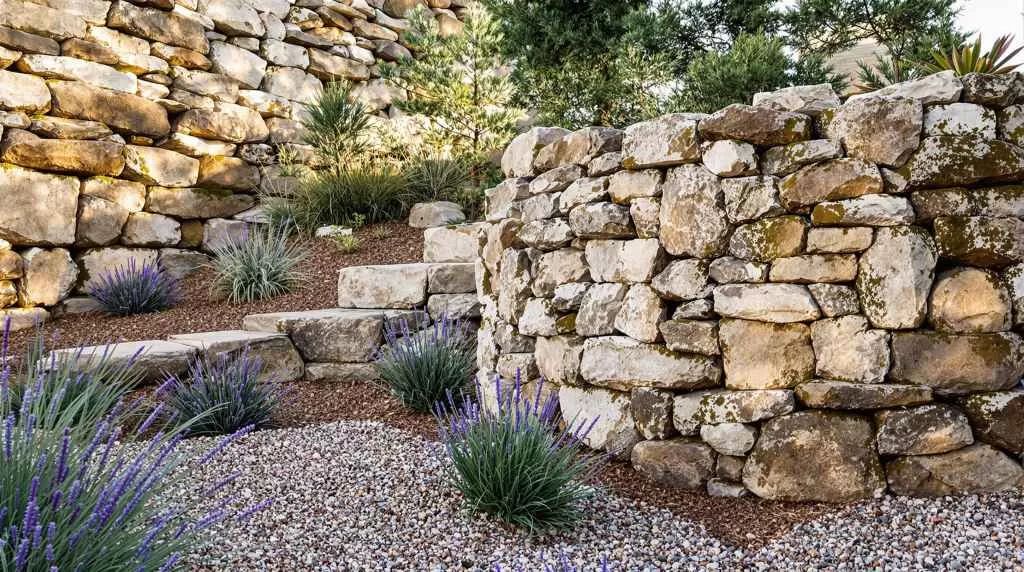
Functional Benefits of Incorporating Stone
Natural stone doesn’t just enhance curb appeal — it solves real landscape challenges. Many of the most effective backyard makeovers in Castle Pines feature stone for its strength, performance, and long-term value in Colorado’s demanding climate.
Long-Term Durability and Low Maintenance
Natural stone is incredibly resilient, holding up to weather, wear, and time with little need for upkeep. It won’t fade, warp, or deteriorate like wood or composite materials, making it a smart long-term investment for patios, walls, and walkways.
Erosion Control and Drainage Management
Strategic stone placement can help with controlling runoff, stabilizing slopes, and improving drainage. Retaining walls, dry creek beds, and river rock swales all support the landscape’s natural flow while adding visual interest.
Fire Resistance in Dry Seasons
Castle Pines often experiences dry, fire-prone summers. Stone is naturally fire-resistant, making it ideal for creating safe zones around fire features, grill stations, or planting beds near structures.
Cooling Effects in Hot Summers
Unlike concrete or synthetic materials, natural stone retains less heat during the day and cools down quickly in the evening. This creates more comfortable surfaces for walking barefoot or lounging on patios during the summer months.
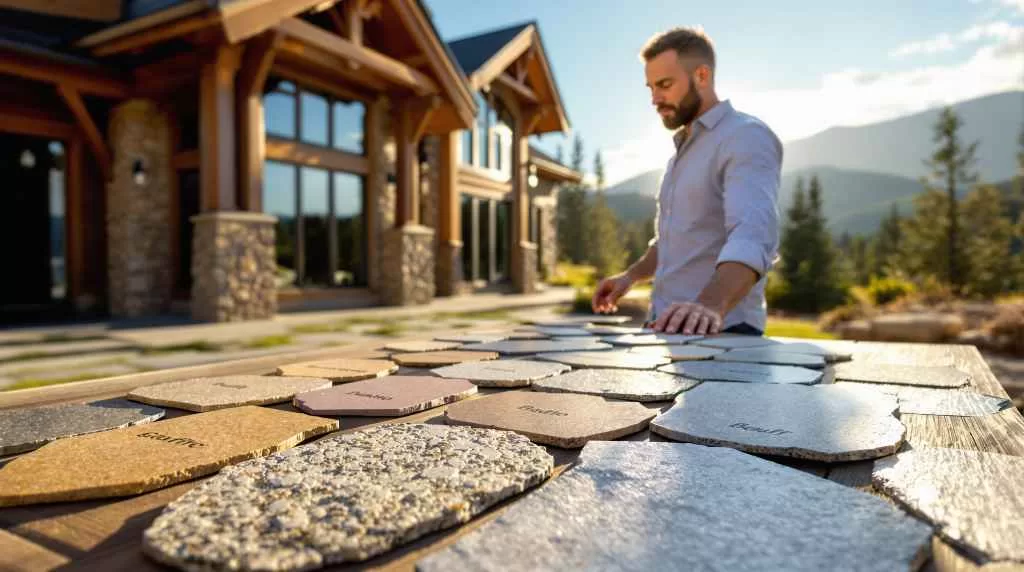
Choosing the Right Stone for Your Landscape Goals
Natural stone plays a big role in many Castle Pines home exterior transformations, but choosing the right type, size, and finish is key to ensuring your landscape looks cohesive and performs as expected for years to come.
Matching Stone Color to Your Home Exterior
Selecting a stone that complements your home’s siding, trim, or roof helps create a unified look. Whether you want a bold contrast or a soft match, stone color can tie the entire design together and boost curb appeal.
Picking the Right Texture and Size
Rough, rugged boulders offer a rustic look, while tumbled or cut stone provides a cleaner, more refined finish. Choosing the right texture and scale ensures the stone fits the design style and purpose of the space.
Sourcing Local vs. Imported Stone
Local stone blends naturally with Colorado’s environment and often meets HOA requirements more easily. Imported varieties can provide unique colors and patterns, but may come with higher costs and longer lead times.
Budget Considerations and Long-Term Value
Natural stone may have a higher upfront cost than other materials, but its low maintenance and long lifespan make it a smart financial decision. This section helps homeowners weigh upfront pricing against durability and resale value.
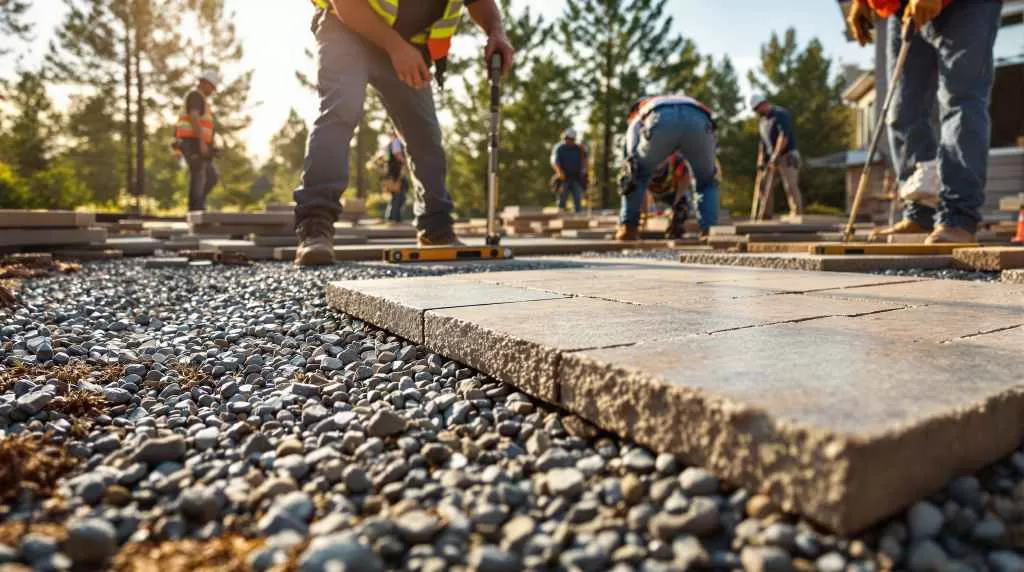
Installation Methods and Best Practices
Proper installation is what separates a long-lasting natural stone feature from one that shifts, cracks, or weathers poorly. Understanding the best practices for working with stone ensures your investment stands the test of time in Castle Pines’ demanding climate.
Excavation and Base Preparation
Every great stone feature starts with a solid foundation. That means proper excavation, compacted gravel base, and the right depth for drainage and stability. Skipping this step can lead to movement, sinking, or water damage over time.
Mortar-Set vs. Dry-Laid Installations
Mortar-set stone offers a more permanent and polished finish, ideal for high-traffic areas or where precision is key. Dry-laid installations, on the other hand, allow for natural drainage and easy repair, making them popular for walkways and garden paths.
Managing Seams, Joints, and Weep Holes
Proper spacing between stones — along with thoughtful weep holes in retaining walls — ensures effective drainage and structural integrity. Filling joints with polymeric sand or gravel keeps weeds out and adds to the overall aesthetic.
Hiring a Professional vs. DIY
While smaller features like stepping stone paths can be DIY-friendly, most stonework requires heavy equipment, precision leveling, and advanced masonry skills. Working with professionals guarantees the project meets structural standards and looks great from day one.
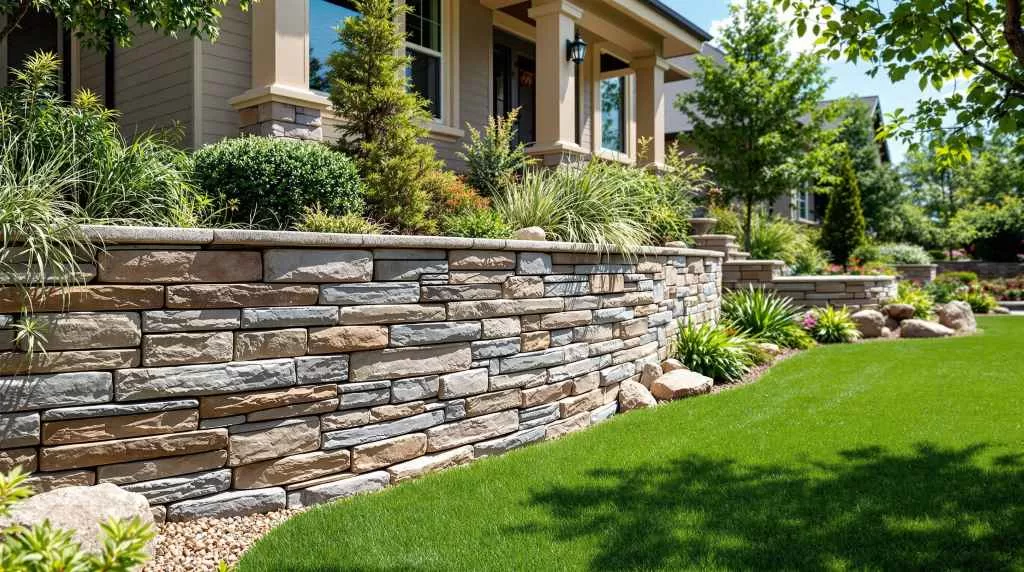
Integrating Natural Stone into HOA-Compliant Designs
Castle Pines neighborhoods often have strict HOA guidelines that influence material choices, colors, and design layouts. The good news? Natural stone is almost always HOA-friendly — as long as you understand how to work within the rules from the start.
Understanding HOA Restrictions and Preferences
Most Castle Pines HOAs prefer materials that blend with the natural environment and match the community’s upscale aesthetic. Stone is generally approved, but each neighborhood may have specific limits on color, size, or application.
Choosing Colors and Textures that Pass Approval
Earth tones like buff, tan, and gray are usually safest, while overly bright or unusual stones may be rejected. Subtle textures and natural finishes are more likely to meet approval than glossy or heavily polished surfaces.
Working with Your Landscape Designer on Submissions
Experienced landscape designers understand how to navigate HOA approval processes and can help prepare renderings, material samples, and descriptions that align with your neighborhood’s expectations. This saves time and avoids costly redesigns.
Examples of HOA-Friendly Stone Installations
Features like flagstone patios, boulder edging, and sandstone retaining walls are regularly approved in Castle Pines communities. Using locally sourced materials in muted tones gives your project a natural, polished look that’s easy to get through review.
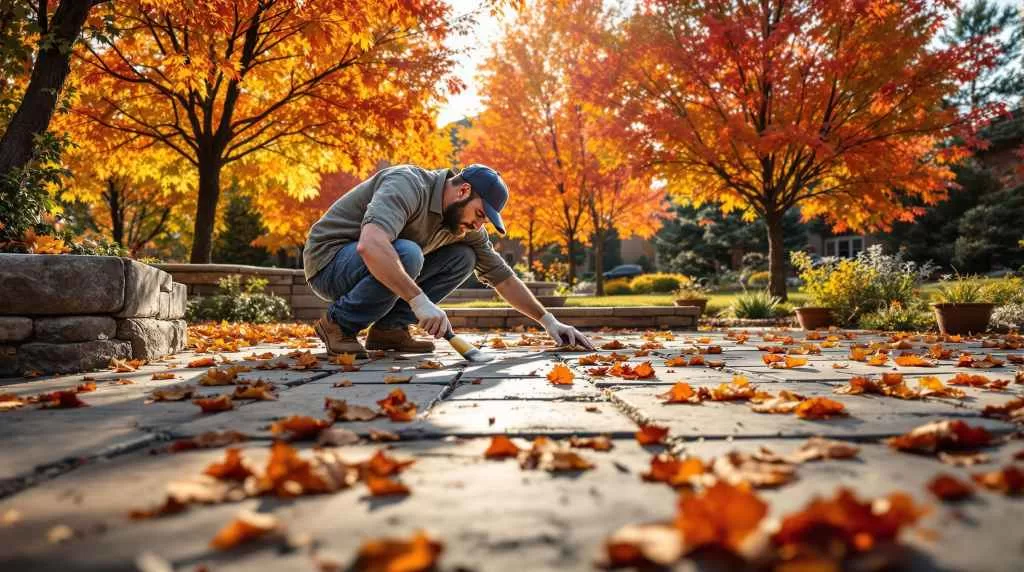
Seasonal Considerations for Natural Stone Maintenance
Castle Pines experiences all four seasons, and each brings unique maintenance needs for your stone features. With the right care, natural stone can stay beautiful and functional year-round, even in Colorado’s freeze-thaw climate.
Preparing Stone Surfaces for Winter
Before the first snowfall, it’s wise to seal porous stones and check for loose joints or shifting slabs. This prevents moisture from seeping in and expanding when frozen, which can cause cracks or uneven surfaces.
Spring Cleaning and Inspections
After winter, give your stone surfaces a gentle cleaning with water and a stiff brush, and inspect for damage caused by ice or snow melt. Addressing small issues early helps prevent larger structural problems down the line.
Managing Weeds in Stone Joints or Pathways
Weeds can take root in the joints of dry-laid paths or between decorative stone mulch. Use polymeric sand, gravel stabilizer, or natural weed preventers to keep joints tidy and low-maintenance throughout the growing season.
Refreshing Decorative Stone Mulch in Summer
Crushed granite, river rock, and other decorative stones may shift or settle over time. A light rake and occasional top-off every couple of seasons will restore the clean, polished look and maintain proper coverage for moisture control.
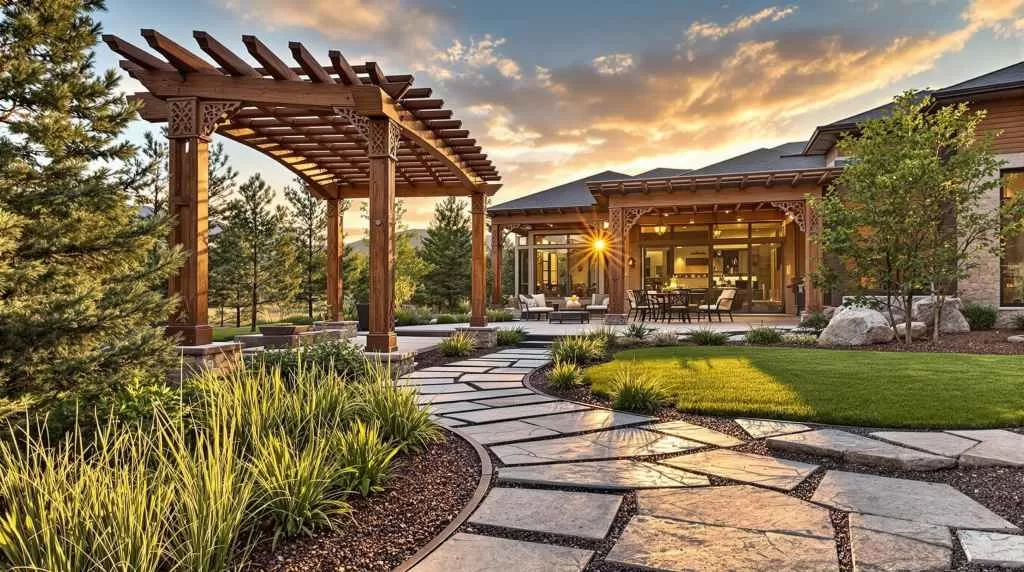
Combining Stone with Other Materials for Visual Impact
Natural stone shines even more when it’s thoughtfully combined with other materials. Blending textures, tones, and finishes helps create a visually dynamic and cohesive landscape that feels custom-built for your Castle Pines home.
Stone and Wood Combinations for Warmth and Contrast
Pairing stone with wood brings out the best of both materials — the earthy ruggedness of stone alongside the warm, natural textures of cedar, redwood, or hardwood. This mix works beautifully for retaining walls next to pergolas or patios that extend from wood decks.
Accenting Stone with Metal Details
Modern metal accents like steel edging, railing, or corten planters add structure and a touch of industrial style. When combined with rough-cut stone, metal details help highlight transitions, borders, and vertical lines in your landscape.
Concrete and Stone: When and How to Mix Them
Stone can be used as an accent to poured concrete or as a surface upgrade to plain hardscape areas. Integrating stone borders or inlays into concrete patios and steps enhances visual interest while maintaining structural efficiency.
Pairing Natural Stone with Lush Plantings
Dense greenery softens stone’s hard surfaces and brings a touch of life to your design. Ornamental grasses, groundcovers, and native perennials planted alongside stone walls or between pathway joints add movement, color, and contrast through every season.
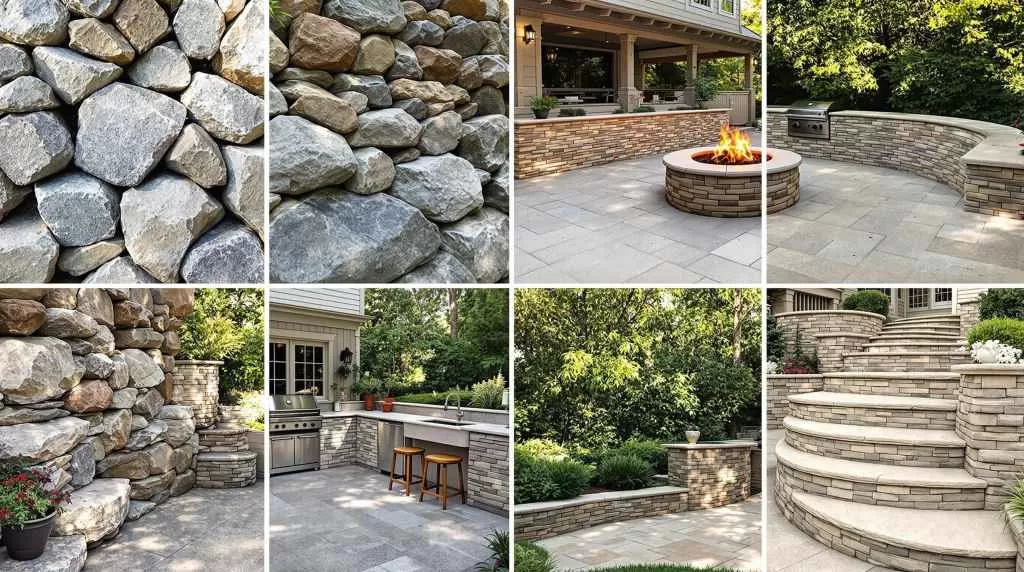
Real Project Examples from Castle Pines
Seeing how natural stone comes to life in real landscapes can help you envision what’s possible for your own yard. These Castle Pines-based examples highlight both the creativity and functionality that custom stonework brings to high-end outdoor living spaces.
A Flagstone Courtyard with a Built-In Fire Pit
This elegant courtyard features multi-toned flagstone pavers arranged in a soft curve around a natural gas fire pit built from the same stone. The layout encourages conversation and creates a cozy ambiance framed by native plantings and low-voltage lighting.
A Multi-Level Boulder Wall for Slope Management
On a steep lot, we constructed a series of boulder retaining walls to create flat, usable space for turf and garden beds. The large stones were carefully placed to feel organic while serving a critical structural role in soil retention and drainage.
Sandstone Steps and Path Leading to a Garden Retreat
This backyard escape includes broad sandstone steps leading down a gently sloped pathway, bordered with ornamental grasses and perennials. The soft golden tones of the stone echo the surrounding foothills and bring a natural rhythm to the garden walk.
Granite Outdoor Kitchen with Matching Fire Feature
A modern outdoor kitchen was finished with polished granite countertops and stacked stone veneer, coordinating seamlessly with a nearby fire feature clad in the same material. The result is a sleek, durable space designed for entertaining year-round.
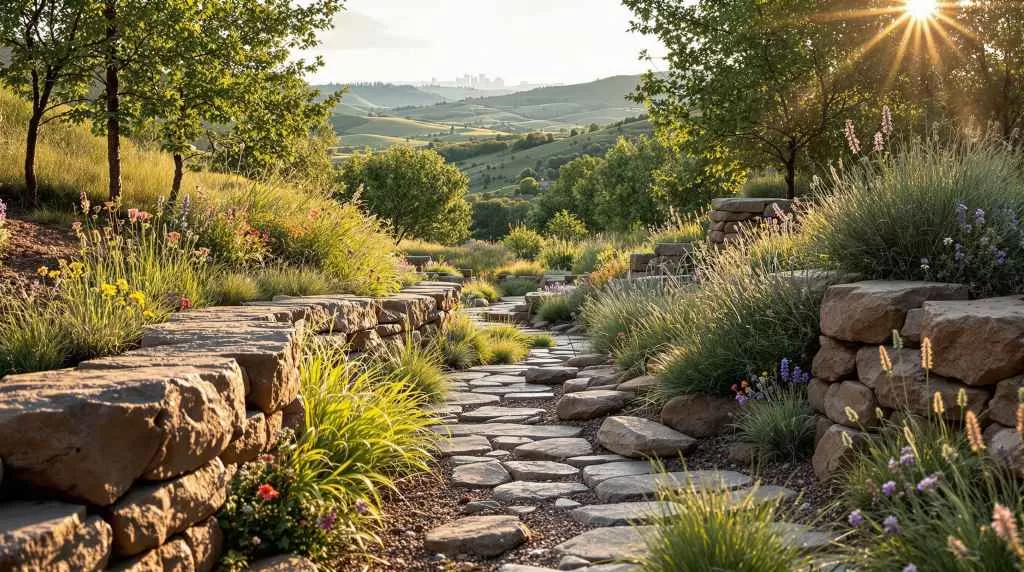
Sustainability Benefits of Using Natural Stone
Natural stone isn’t just a beautiful and durable material — it’s also an eco-conscious choice. For Castle Pines homeowners who value long-term sustainability and low environmental impact, stone offers benefits that manufactured products often can’t match.
Reducing the Carbon Footprint with Local Stone
Sourcing stone from regional quarries reduces the emissions associated with long-distance shipping. Using locally available sandstone, granite, or buff stone helps support the regional economy while minimizing environmental impact.
Long Lifespan Reduces Waste Over Time
Unlike wood or composite materials that degrade or require replacement every few years, natural stone lasts for decades with minimal maintenance. Its longevity reduces waste and conserves resources over the life of your landscape.
No Harmful Chemicals or Off-Gassing
Natural stone is a non-toxic material that doesn’t release harmful VOCs or degrade under UV rays like some synthetics. It’s a safe and stable option, especially for families with kids or pets who spend time outdoors.
Reusability of Stone in Future Projects
Even when landscape designs change, stone can be reclaimed, repurposed, or reused in new features. Whether it’s moving pavers to a new patio or using old wall stone as garden edging, its durability extends its lifecycle far beyond its original use.
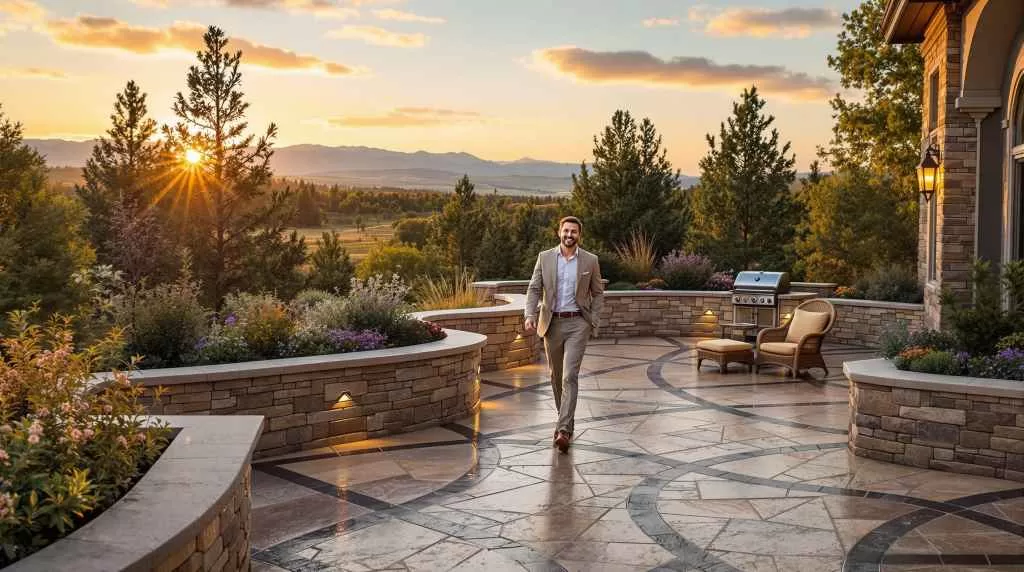
Ready to Transform Your Outdoor Space?
If you’re ready to bring the timeless beauty and lasting value of natural stone to your Castle Pines landscape, our team is here to help. At Custom Landscapes by Design, we specialize in creating custom outdoor spaces that reflect the elegance of Castle Pines while standing up to Colorado’s climate. Whether you’re in Castle Pines, Castle Rock, Parker, or surrounding areas, we’ll guide you through every step — from material selection to final installation. Let’s turn your vision into a stunning, stone-crafted reality you’ll enjoy for years to come.

